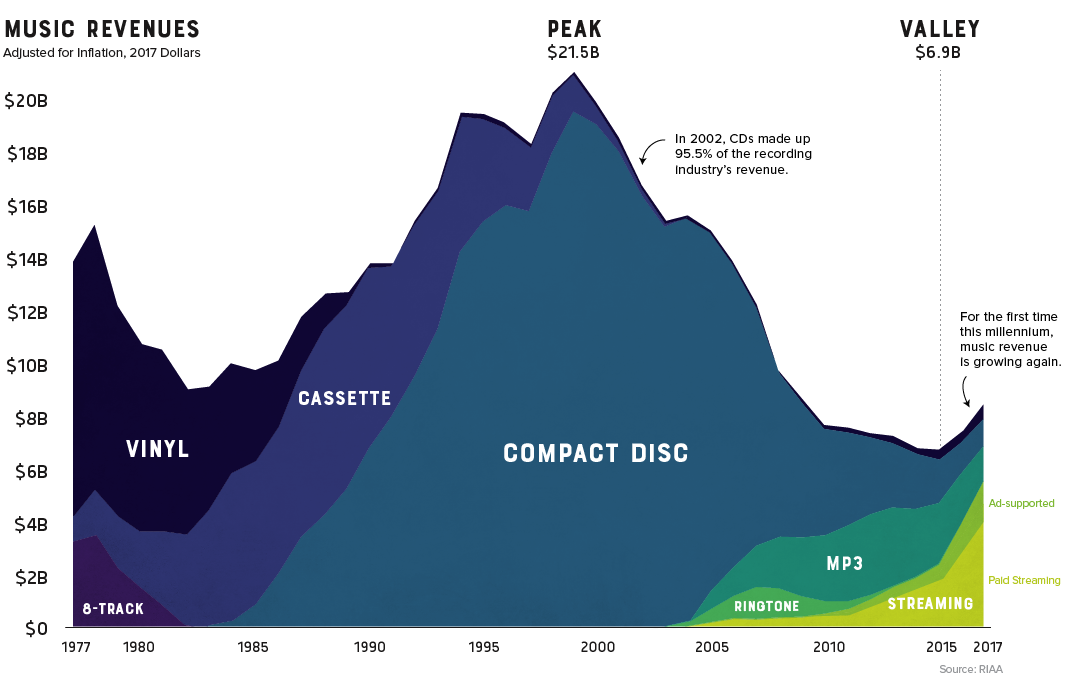When I read the Weller and Anderson (2013) ideas about digital resilience, I felt triggered in many ways by comparisons and analogies that they have put forward to frame the term “digital resilience”. One of the questions I asked myself was if technological development or digitalization can be a disruptive factor for higher educations institutions? Is the comparison with MP3 (Weller and Anderson, 2013, p. 56) for music is actually valid? Overall, the impact of the MP3 on music was not disruptive. If anything, the music industry began growing again only after the digitalization and introduction of MP3 file format around 25 years ago (see chart below):

What happened to the industry then? It obviously wasn’t digitalization that was disruptive for its growth, but economic factors associated with historical stagnation. If we take the look at the chart – that something like that happened in the 1970s and 1980s when digital formats were not present in the picture.
As the MP3 analogy doesn’t seem credible when it comes to the music industry, so too am I skeptical about the possible disruptive effect of MOOCs and Open Access publishing on higher education. (Ibid.) If anything the MOOCs have the ability to attract more students into the universities and increase the demand for higher education, because they provide an interesting “preview” to university life, that prospective students would like to explore more. And that is exactly what is happening – the demand is rising exponentially, as described by Wiley (2010).
Moreover, Open Access has the potential to create an opportunity for more efficient use of resources for research. For example by reducing duplicative R&D and by increasing the rate of accumulation of the stock of knowledge (see chart below):

The same goes to the current pandemic and its effect on universities. Is it going to profoundly effect the university functions? Are they going to change substantially? Will they stop being at the forefront of education and research? For now, the substantial changes are not forthcoming, in my view, and the disruptive effect of digitalization alludes me.
Then, let’s take the ‘digital resilience’ according to Weller and Anderson as the capacity of an educational system to absorb disturbance from technological development and reorganize while undergoing change, so as to retain essentially the same function, structure, identity and feedbacks. (Weller and Anderson, 2013; Hopkins 2009) It is unclear how much of substantial disturbance needs to be caused by the technological development in order to actually speak of resilience as being relevant to the higher education institutions overall. Moreover, the subjective nature of measurements that Weller and Anderson put forward (2013, p. 63) cast doubt on the methodological integrity of their conclusions. It would be much more telling to actually look at the revenue production of the these universities especially since 2013 and see if the fear of MOOCs and Open Access that will ‘cannibalize existing profit and support centres that have sustained the institution in past eras’ (Ibid.) is actually grounded in reality. Wouldn’t it?
Openness is more than just content…
If you want to know more:
Hopkins, R. (2009). Resilience Thinking. Resurgence, p. 257.
Weller, Martin and Anderson, Terry (2013). Digital resilience in higher education. European Journal of Open, Distance and e-Learning, 16(1) pp. 53-66.
Wiley, D. (2010). TEDX NYED < https://www.youtube.com/watch?v=Rb0syrgsH6M&ab_channel=TEDxTalks>
